|
|
|
Sort Order |
|
|
|
Items / Page
|
|
|
|
|
|
|
| Srl | Item |
| 1 |
ID:
109155
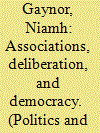

|
|
|
|
|
| Publication |
2011.
|
| Summary/Abstract |
Over the past two decades there has been a burgeoning interest and research into experiments and innovations in participatory governance. While advocates highlight the merits of such new governance arrangements in moving beyond traditional interest group representations and deepening democracy through deliberation with a broad range of civic associations, critics express concern about the political legitimacy and democratic accountability of participating associations, highlighting in particular the dangers of co-option and faction. Addressing these concerns, a number of theorists identify an important role for civic associations in linking deliberations at micro policy levels to those within the public sphere more broadly. These normative contributions raise an important empirical question-does civic associational engagement at micro levels leave scope to engage both laterally across associations and vertically with members and citizens more broadly? More simply put, is civic associational engagement within micro-policy fora "good" for democracy more broadly? Drawing from a study of civic associational engagement in Ireland's national Social Partnership process over a ten-year period this article argues that, where deliberations become overshadowed by more traditional communicative norms of bargaining and negotiation, it is not. Evidence is presented from the Irish case to show how civic actors, having internalized the dominant communicative norms of the process, have contributed toward a narrowing of the deliberative space within, but most particularly outside, this process. This, it is argued, has resulted in a considerably weakened public sphere with neither the institutional apparatus nor the discursive capacity to seek accountability from political and civic leaders at a time of profound crisis within the Irish state.
|
|
|
|
|
|
|
|
|
|
|
|
|
|
|
|
| 2 |
ID:
107204


|
|
|
|
|
| Publication |
2011.
|
| Summary/Abstract |
Despite increasing support for participatory and deliberative principles amongst academics, practitioners and parliamentarians alike, efforts to infuse political systems with more inclusive and consensual forms of debate often founder. This article explores this conundrum by examining institutional reforms through the lens of deliberative democracy. More specifically, we scrutinise attempts to institutionalise forms of civic deliberation within the Scottish political system via the Scottish Civic Forum and the Scottish Parliament's committee system. Our analysis tells the story of how these two types of institutional reform, both designed to facilitate the move towards a more participatory and deliberative model of democracy in Scotland, have fared over a ten-year period. In turn, this analysis allows us to comment on the ways in which deliberative and parliamentary democracy may be integrated.
|
|
|
|
|
|
|
|
|
|
|
|
|
|
|
|
| 3 |
ID:
140463
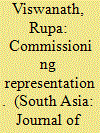

|
|
|
|
|
| Summary/Abstract |
Commissions of inquiry are unique tools of modern governance that represent ‘the people’, but in a manner quite unlike parliaments and other forms of elected political representation. Using as its example the 2007 Misra Report, this paper reveals how, in the production of a commission report, scores of non-state actors—‘stakeholders’ from a wide range of social strata—are enlisted to produce the policies that will then redound upon those very stakeholders. In thus consulting the people and eliciting their speech, commissions serve to publicly enact, in a controlled setting, the deliberative ideal of democracy that is otherwise absent in India. In this particular instance, the problematic status of Dalits is subsumed under the normative religious identity of the post-colonial Indian nation, a conclusion whose emergence through reasoned debate is publicly enacted in the form of the commission.
|
|
|
|
|
|
|
|
|
|
|
|
|
|
|
|
| 4 |
ID:
154147
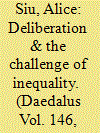

|
|
|
|
|
| Summary/Abstract |
Deliberative critics contend that because societal inequalities cannot be bracketed in deliberative settings, the deliberative process inevitably perpetuates these inequalities. As a result, they argue, deliberation does not serve its theorized purposes, but rather produces distorted dialogue determined by inequalities, not merits. Advocates of deliberation must confront these criticisms: do less-privileged, less-educated, or perhaps illiterate participants stand a chance in discussions with the more privileged, better educated, and well spoken? Could their arguments ever be perceived or weighed equally? This essay presents empirical evidence to demonstrate that, in deliberations that are structured to provide a more level playing field, inequalities in skill and status do not translate into inequalities of influence.
|
|
|
|
|
|
|
|
|
|
|
|
|
|
|
|
| 5 |
ID:
084768
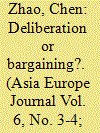

|
|
|
| 6 |
ID:
110529
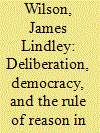

|
|
|
|
|
| Publication |
2011.
|
| Summary/Abstract |
Deliberative democratic theorists argue that important moral questions turn on whether regimes are sufficiently deliberative. To attribute "deliberativeness" to a regime, we need an account of "deliberative integration" that connects such a holistic assessment to the acts or qualities of individuals and smaller groups. I turn to Aristotle's Politics for instruction in developing such accounts, arguing that he judges regimes according to how reliably they act pursuant to excellent common deliberation-a manner of excellent rule that I call the "rule of reason." I then interpret Aristotle's metaphorical argument for the "wisdom of the multitude" to establish the claim that democracies may best integrate citizens' deliberations. This interpretation illuminates Aristotle's complex evaluation of regimes, including his ambivalent views on the rule of the many. It also suggests a structure for contemporary accounts of deliberative integration helpful even for those who differ from Aristotle in their basic moral concerns.
|
|
|
|
|
|
|
|
|
|
|
|
|
|
|
|
| 7 |
ID:
179003


|
|
|
|
|
| Summary/Abstract |
Rational deliberation helps to avoid cyclic or intransitive group preferences by fostering meta-agreements, which in turn ensures single-peaked profiles. This is the received view, but this paper argues that it should be qualified. On one hand we provide evidence from computational simulations that rational deliberation tends to increase proximity to so-called single-plateaued preferences. This evidence is important to the extent that, as we argue, the idea that rational deliberation fosters the creation of meta-agreement and, in turn, single-peaked profiles does not carry over to single-plateaued ones, and the latter but not the former makes coherent aggregation possible when the participants are allowed to express indifference between options. On the other hand, however, our computational results show, against the received view, that when the participants are strongly biased towards their own opinions, rational deliberation tends to create irrational group preferences, instead of eliminating them. These results are independent of whether the participants reach meta-agreements in the process, and as such they highlight the importance of rational preference change and biases towards one’s own opinion in understanding the effects of rational deliberation.
|
|
|
|
|
|
|
|
|
|
|
|
|
|
|
|
| 8 |
ID:
092870
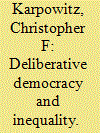

|
|
|
|
|
| Publication |
2009.
|
| Summary/Abstract |
Deliberative democracy grounds its legitimacy largely in the ability of speakers to participate on equal terms. Yet theorists and practitioners have struggled with how to establish deliberative equality in the face of stark differences of power in liberal democracies. Designers of innovative civic forums for deliberation often aim to neutralize inequities among participants through proportional inclusion of disempowered speakers and discourses. In contrast, others argue that democratic equality is best achieved when disempowered groups deliberate in their own enclaves (interest groups, parties, and movements) before entering the broader public sphere. Borrowing from each perspective, the authors argue that there are strong reasons to incorporate enclave deliberation among the disempowered within civic forums. They support this claim by presenting case study evidence showing that participants in such forums can gain some of the same benefits of deliberation found in more heterogeneous groups (e.g., political knowledge, efficacy and trust), can consider a diversity of viewpoints rather than falling into groupthink and polarization, and can persuade external stakeholders of the legitimacy of the group's deliberations.
|
|
|
|
|
|
|
|
|
|
|
|
|
|
|
|
| 9 |
ID:
088079
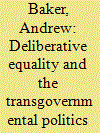

|
|
|
|
|
| Publication |
2009.
|
| Summary/Abstract |
Revisiting the concept of transgovernmentalism, originally developed by Robert Keohane and Joseph Nye, can shed considerable light on the nature of interstate cooperation in contemporary global financial governance. Transgovernmentalism highlights how certain technocratic policy communities, composed of finance ministries, central banks, and regulators, dominate the global financial architecture. It also provides insights into the political and social basis of these actors' interactions and deliberations. Most importantly, renovating the concept of transgovernmentalism brings the participatory deficits in the current global financial architecture into sharp focus and points us in the direction of a workable reform agenda that would expand inclusion and participation. This article advocates basing future reform on efforts to achieve a closer realization of the principle of "deliberative equality." Unfortunately, "transgovernmentalism" is incompatible with deliberative equality, meaning that it is precisely the transgovernmental characteristics of the current global financial architecture that have to be challenged and overturned if we are to arrive at anything approximating deliberative equality.
|
|
|
|
|
|
|
|
|
|
|
|
|
|
|
|
| 10 |
ID:
095618
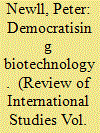

|
|
|
|
|
| Publication |
2010.
|
| Summary/Abstract |
There is now significant policy and academic interest in the governance of science and technology for sustainable development. In recent years this has come to include a growing emphasis on issues of public understanding of science and innovative processes of deliberative and inclusive policy-making around controversial technologies such as nuclear power and agricultural biotechnology. Concern with such issues coincides with rising levels of interest in deliberative democracy and its relationship to the structures and processes of global governance. This article connects these two areas through a critical examination of 'global' deliberations about agricultural biotechnology and its risks and benefits. It draws on an extensive survey concerned with the diverse ways in which a range of governments are interpreting and implementing their commitments under the Cartagena Protocol on Biosafety regarding public participation and consultation in order to assess the potential to create forms of deliberation through these means. The article explores both the limitations of public deliberation within global governance institutions as well as of projects whose aim is to impose participation from above through international law by advocating model approaches and policy 'tool kits' that are insensitive to vast differences between countries in terms of capacity, resources and political culture.
|
|
|
|
|
|
|
|
|
|
|
|
|
|
|
|
| 11 |
ID:
146890
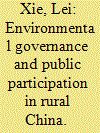

|
|
|
|
|
| Summary/Abstract |
This article investigates participatory environmental management in rural China. It first summarizes the extent, role and key drivers of public participation in environmental politics in China. It then investigates main scenarios of interaction between the Chinese public and the state, in order to assess the array of possibilities for political participation in environmental matters. This comparative study of public participation in environmental management focuses on grass-roots initiatives that point to increasing public enthusiasm for policymaking processes. The article concludes that participatory practices have impacted significantly upon environmental governance by facilitating implementation and bettering policy and, to a certain extent, legitimizing the discretion of environmental protection agencies. The article also indicates that grass-roots deliberative participation has successfully achieved its goal of improving the provision of social services and public goods. While the government’s initial approach was to improve policy implementation without triggering political contestation, at grass-roots level this strategy has created a sense of political awareness.
|
|
|
|
|
|
|
|
|
|
|
|
|
|
|
|
| 12 |
ID:
110773
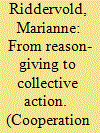

|
|
|
|
|
| Publication |
2011.
|
| Summary/Abstract |
The aim of this article is to contribute to the further development of deliberative theory-to make it more applicable to research on EU integration-by establishing alternative and more concise micro-mechanisms to those of the rationalist bargaining perspectives. It is suggested that the micro-mechanism through which deliberation has an effect on outcomes is what is termed argument-based learning, which means that an actor accepts the validity of a presented argument so that (s)he acts upon it. Moreover, the article differentiates between three types of argument-based learning considered relevant in the EU context. On this basis, it suggests a two-step analytical approach for studies of EU decision-making processes. In trying out the empirical relevance of the framework, it is applied to a case where one would not expect agreements on common EU policies to have been reached due to argument-based learning, namely EU coordination towards the Maritime Labour Convention (MLC). The framework proved helpful in accounting for agreements that are puzzling from a rationalist perspective.
|
|
|
|
|
|
|
|
|
|
|
|
|
|
|
|
| 13 |
ID:
059294
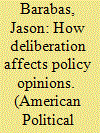

|
|
|
| 14 |
ID:
168709
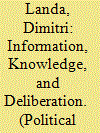

|
|
|
| 15 |
ID:
053823
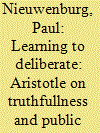

|
|
|
| 16 |
ID:
077887
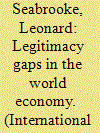

|
|
|
|
|
| Publication |
2007.
|
| Summary/Abstract |
Since the Asian financial crisis of 1997-1998, the International Monetary Fund (the Fund) has been embroiled in an international crisis of legitimacy. Assertions of a crisis are premised on the notions that the Fund's voting system is unfair, that the Fund enforces homogeneous policies onto borrowing member states and that loan programmes tend to fail. Seen this way, poor institutional and policy design has led to a loss of legitimacy. But institutionalised inequalities or policy failure is not in itself sufficient to constitute an international crisis of legitimacy. This article provides a conceptually-driven discussion of the sources of the Fund's international crisis of legitimacy by investigating how its formal 'foreground' institutional relations with its member states have become strained, and how informal 'background' political and economic relationships are expanding in a way that the Fund will find difficult to re-legitimate. The difference between the Fund's claims to legitimacy and how its member states, especially borrowers, act has led to the creation of a 'legitimacy gap' that is difficult to close. However, identifying the sources of the Fund's international crisis of legitimacy allows us to explore what avenues are available to resolve the crisis.
|
|
|
|
|
|
|
|
|
|
|
|
|
|
|
|
| 17 |
ID:
077445
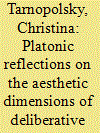

|
|
|
|
|
| Publication |
2007.
|
| Summary/Abstract |
This essay utilizes Plato's insights into the role of shame in dialogical interactions to illuminate the aesthetic dimensions of deliberative democracy. Through a close analysis of the refutation of Polus in Plato's dialogue, the Gorgias, I show how the emotion of shame is central to the unsettling, dynamic, and transformative character of democratic engagement and political judgment identified by recent aesthetic critics of Habermas' model of communicative action and democratic deliberation. Plato's analysis of shame offers a friendly amendment to these aesthetic critiques by showing how the psychological forces at the heart of shame make the outcome of our political engagements with others uncertain and unsettling, even while they make possible the kind of self-reflexivity necessary to foster the deliberative virtue of sincerity or truthfulness
|
|
|
|
|
|
|
|
|
|
|
|
|
|
|
|
| 18 |
ID:
131706
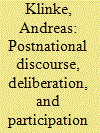

|
|
|
|
|
| Publication |
2014.
|
| Summary/Abstract |
An emerging task in world politics is to cope with human-induced global risks in domains such as environment, economy, security, and health. Current global governance institutions are largely incapable of tackling global risks and applying deductive policy models, which is why new modes of interaction may become essential. In this article I argue that through focused discourses, key peculiarities of global risks, namely complexity, scientific uncertainty and sociopolitical ambiguity, may be identified and understood. To this end, distinctively discursive and pragmatic learning processes can be developed. Different forms of deliberation and participation help develop processes that meet the challenges, problems, and conflicts that result from the key peculiarities of global risks. Hence, the article establishes a causal link between key peculiarities of global risks and postnational discourses. I discuss the varying forms of deliberation and participation (epistemic institutions, associational policy making, and transnational public deliberation and participation) of three discourses that produce institutional problem solving capacity in global risk governance. To this end, this article links theory and practice as well as normative conceptualisation and institutional feasibility.
|
|
|
|
|
|
|
|
|
|
|
|
|
|
|
|
| 19 |
ID:
117491
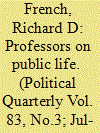

|
|
|
|
|
| Publication |
2012.
|
| Summary/Abstract |
Many academics misunderstand public life and the conditions under which policy is made. This article examines misconceptions in three major academic traditions-policy as science (e.g., 'evidence-based policy'), normative political theory, and the mini-public school of deliberative democracy-and argues that the practical implications of each of these traditions are limited by their partial, shallow and etiolated vision of politics. Three constitutive features of public life, competition, publicity and uncertainty, compromise the potential of these traditions to affect in any fundamental way the practice of politics. Dissatisfaction with real existing democracy is not the consequence of some intellectual or moral failure uniquely characteristic of the persona publica, and attempts to reform it are misdirected to the extent that they imagine a better public life modeled on academic ideals.
|
|
|
|
|
|
|
|
|
|
|
|
|
|
|
|
| 20 |
ID:
091504


|
|
|
|
|
| Publication |
London, Routledge, 2009.
|
| Description |
xiii, 227p.
|
| Standard Number |
9780415481038
|
|
|
|
|
|
|
|
|
|
|
|
Copies: C:1/I:0,R:0,Q:0
Circulation
| Accession# | Call# | Current Location | Status | Policy | Location |
| 054515 | 328.23/SET 054515 | Main | On Shelf | General | |
|
|
|
|
|
|
|
|
|